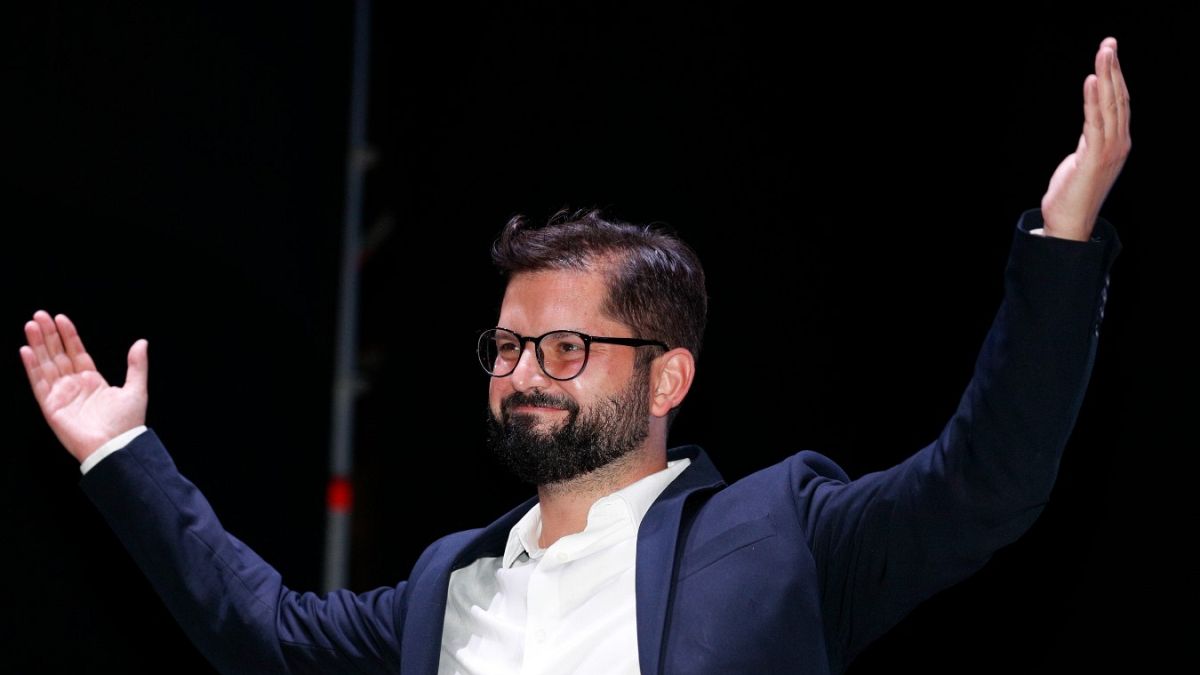At 35, Boric will become Chile’s youngest modern president when he takes office in March.
A leftist millennial who rose to prominence during anti-government protests was elected Chile’s next president Sunday after a bruising campaign against a free-market firebrand likened to Donald Trump.
With 56% of the votes, Gabriel Boric handily defeated by more than 10 points lawmaker José Antonio Kast, who tried unsuccessfully to scare voters that his inexperienced opponent would become a puppet of his allies in Chile's Communist Party and upend the country's vaunted record as Latin America's most stable, advanced economy.
It is the first time since the return of democracy three decades ago that the candidate who led in the first round was defeated in the run-off. Kast, who has a history of defending Chile's past military dictatorship of Augusto Pinochet, finished two points ahead of Boric in the first round.
Chile's youngest president
Amid a crush of supporters, Boric vaulted atop a metal barricade to reach the stage where he initiated in the indigenous Mapuche language a rousing victory speech to thousands of mostly young supporters.
The bearded, bespectacled president-elect highlighted the progressive positions that launched his improbable campaign, including a promise to fight climate change by blocking a proposed mining project in what is the world's largest copper producing nation.
He also promised to end Chile's private pension system — the hallmark of the neoliberal economic model imposed by the dictatorship of Gen. Augusto Pinochet.
“We are a generation that emerged in public life demanding our rights be respected as rights and not treated like consumer goods or a business,” Boric said. “We know there continues to be justice for the rich, and justice for the poor, and we no longer will permit that the poor keep paying the price of Chile's inequality.”
He also gave an extended shout out to Chilean women, a key voting bloc who feared that a Kast victory would roll back years of steady gains, promising they will be “protagonists” in a government that will seek to “leave behind once and for all the patriarchal inheritance of our society.”
At 35, Boric will become Chile’s youngest modern president when he takes office in March and only the second millennial to lead in Latin America, after El Salvador’s Nayib Bukele. Only one other head of state, Giacomo Simoncini of the city-state San Marino in Europe, is younger.
His government is likely to be closely watched throughout Latin America, where Chile has long been a harbinger of regional trends.
Kast dogged by family's past
Kast, 55, a devout Roman Catholic and father of nine, emerged from the far-right fringe after having won less than 8 per cent of the vote in 2017.
He rose steadily in the polls this time with a divisive discourse emphasising conservative family values and playing on Chileans' fears that a surge in migration — from Haiti and Venezuela — is driving crime.
Kast has a record of attacking Chile's LGBTQ community and advocating more restrictive abortion laws. He also accused outgoing President Sebastián Piñera, a fellow conservative, of betraying the economic legacy of Pinochet, a figure he openly admires.
Kast's brother, Miguel, was one of Pinochet's top advisers.
Kast proclaimed he was not an extremist and doesn't "feel far-right" after he was dogged by revelations that his German-born father had been a card-carrying member of Adolf Hitler's Nazi party.
A divided congress
The EU's top foreign affairs official, Josep Borrell, congratulated Boric on his victory.
"We hope to further strengthen our relationships with the future government of Chile, he wrote on Twitter, adding: "We are partners and together we are stronger."
Boric's agenda could however be hindered by a divided congress.
In addition, the political rules could soon change because a newly elected convention is rewriting the country's Pinochet-era constitution.
The convention — the nation's most powerful elected institution — could in theory call for new presidential elections when it concludes its work next year and if the new charter is ratified in a plebiscite.
The leader of a military junta and self-proclaimed president, Pinochet ruled Chile from 1973 to 1990. He came to power in a US-backed coup, followed by brutal repression that saw about 3,000 people killed, while more than 1,000 are missing to this day.
Heavily influenced by free-market-oriented libertarians who studied under Milton Friedman, Pinochet and his government implemented a series of reforms around economic liberalisation, removing tariff protections for local industry, banning trade unions, and privatising hundreds of state-owned enterprises.
